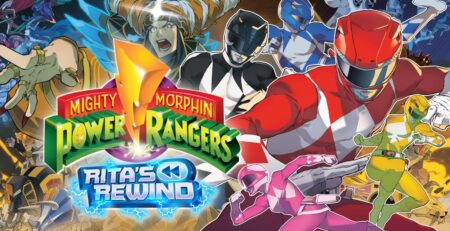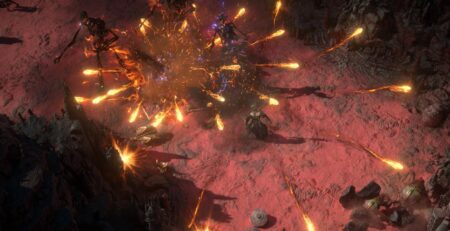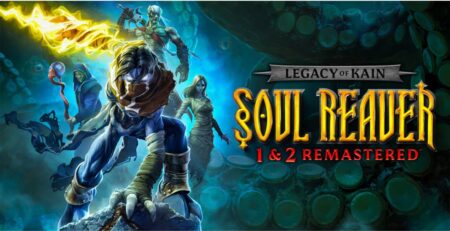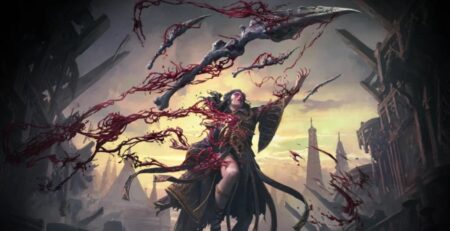On the edges of the Imperium of Man, Rogue Traders govern huge swathes of space. Their words are law, and to cross them invites retribution in the most painful forms. But when one such Rogue Trader dies unexpectedly, their next of kin is thrust, unprepared, into the world of skirmishes, inter-clan politics, and religious zealotry. Developer/publisher Owlcat Games challenges players to take on the role of this new Rogue Trader and navigate the waters of combat, politics, and religion in the turn-based RPG Warhammer 40K: Rogue Trader.
The classic slogan for the Warhammer 40K universe has always been “In the grim darkness of the distant future, there is only war.” As it turns out, a lot is happening outside of war. While combat, both ground and space, are key elements of Warhammer 40K: Rogue Trader the player spends equal, if not more time dealing with dignitaries and other assorted agreived individuals. These social challenges are not new to gaming, as branching dialogue options and player alignments impacting character interactions are nothing new, but the setting that this game lives in gives the narrative element a unique twist.
The universe players are thrust into is one of unforgiving danger. Tyrannical rule is the order of the day. However, there is more reason for it here than in most worlds. When the dangers of warp-spawned daemons exist wherever a corrupt heart dwells, and ancient artifacts of power can condemn an entire world if they fall into unprepared hands, the unrelenting adherence to the laws and codes set down in the brutal Imperium of Man look a bit more understandable. While narrative choice games love to present players with situations mired in shades of grey, Warhammer 40K: Rogue Trader takes the concept to a higher level. Player are often left with no answer they will like if they expect to play the “good guy” in their journey. Keeping the corruption of the warp at bay and feeding your people, while also dealing with other representatives of the Imperiumm constantly forces the player to weigh their options carefully. Any decision can cause the deaths of thousands.
While the final decision always falls on the Rogue Trader’s shoulders, they are not tasked with facing all of these decisions alone. As the player adventures through the stars, they will amass a retinue of personalities to aid them both in combat and in social circumstances. Depending on who you bring with you on your missions, you gain access to extra intel that helps inform your decision-making, as well as shared stats for skill-based dialogue options. From psyckers that can see the color of the lies enemies speak, to accomplished bureaucrats who can clarify when a person really can’t do the thing you are asking of them, these characters come to be just as important to the Rogue Trader out of combat as they are in it.
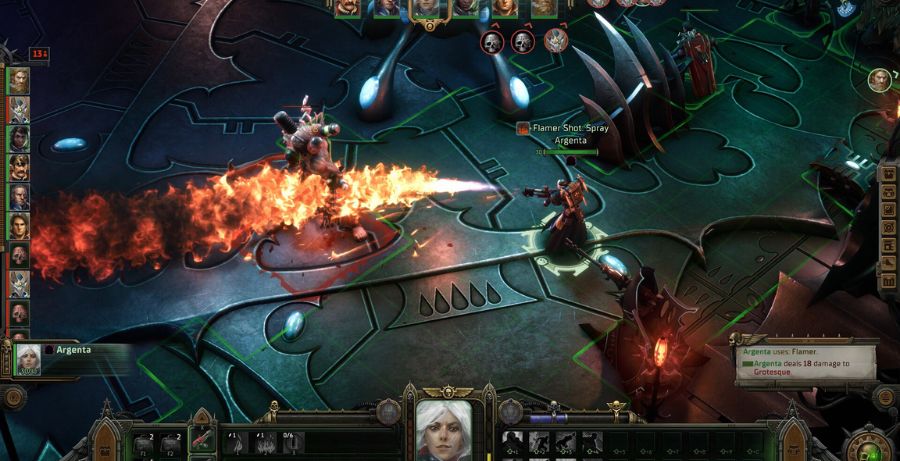
While your party helps you navigate the many challenges Warhammer 40K: Rogue Trader presents, they also can bring their own with them. Depending on the nature of the individual, there could be conflicts aboard your ship or with those you meet outside your ship due to their presence. Also, party members will have their own goals and missions they will seek help with from their leader. These each bear unique levels of weight. While you may feel like you can ignore a request from your seneschal, can you ignore the desires of a member of the Imperial Inquisition, whose authority can doom worlds with the stroke of a pen? Who you trust and how far that trust goes creates an interesting dynamic within your team. There is a far greater sense that those in your squad my betray you than in most games of its type, making each complaint feel like it could push a party member away.
While there is more to the world of Warhammer 40K: Rogue Trader than war, direct conflict still makes up a sizable amount of the player’s time. While some clashes can be talked around, more often than not, there comes a point where the chain swords and bolters get drawn and blood gets shed. Delivering these moments is a system that is fun, yet thoroughly confusing.
The core tactics gameplay itself is exciting and moderately challenging. Most battles see the player’s team of six characters faced with huge numbers of enemies. Most of these enemies are low-level opponents, usually defeated with a single hit. Sprinkled in amongst the crowd will be a couple of genuine threats. These characters can range from cultist leaders to daemons and even Chaos Space Marines. These threats require far more delicate handling than their weaker underlings. The action in these moments is delivered well. With laser blasts incinerating enemies, chain swords causing gore to spill from fallen foes, and gouts of flame engulfing enemies, the brutality of the combat is well-presented. Each psychic ability comes with its unique visual prompt, helping to make each feel singular from the rest.
To survive these lengthy battles, many taking upwards of an hour to play through, players must utilize cover and their squad’s skills to survive the enemy’s onslaught. With numerous different classes and advanced classes to unlock, there are lots of options for how a player can approach battlefield challenges. Melee characters can slaughter their way through ranks of minions with huge, cleaving swings, while ranged snipers pick off critical targets, support characters reinforce stats, and even grant allies extra actions.
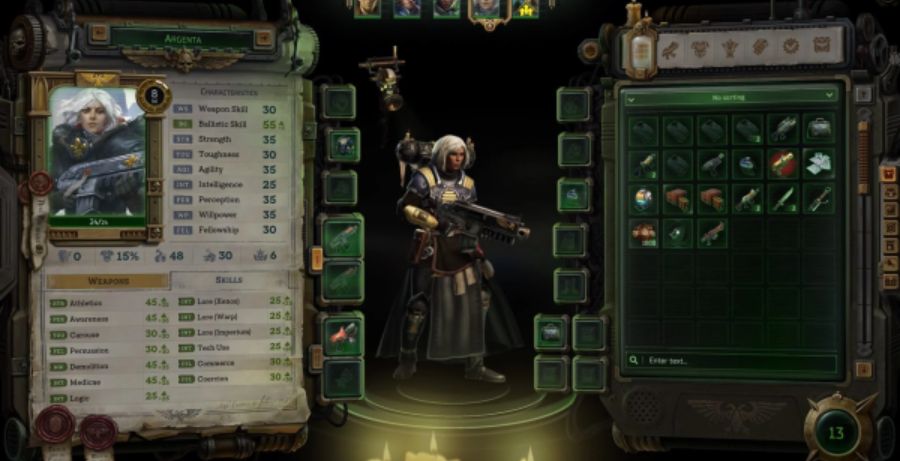
While the core of Warhammer 40K: Rogue Trader‘s ground-based combat is enjoyable, there are times when it perplexes. Many abilities are extremely complex, with the finer details hidden behind complicated math problems that I could never solve. And when stronger enemies have numerous different abilities you have never seen before, just figuring out what is causing something to happen can become a chore as you sift through paragraphs of descriptions.
Combat is further hindered by numerous technical bugs. While I never ran into anything game-breaking, some recurring issues dampened my enjoyment of the gameplay. The biggest of these is the game’s tendency to stop displaying some critical information during attacks. Normally, enemy health, your percentage chance to hit, and how much damage you will do are all displayed when considering taking an action to inform your choice. During more than one fight, this information stopped appearing, telling me only if the target was valid or not.
While the bulk of combat in Warhammer 40K: Rogue Trader is done planet side, there are moments where you must pit your void ship against your enemies in ship-to-ship combat. These engagements are fine, given how infrequently they occur. Each weapon mounted on a ship has a unique arc that players must steer their ship through the battlefield to properly utilize. Because ships need to be in constant motion, managing the distance and angles to line up shots can be difficult and mildly frustrating. But when you can catch an enemy with a perfectly lined-up barrage of shots, reducing the former threat to a hunk of space debris, there is a sense of earned triumph.
Unsurprisingly, the mix of fun and confusion in the game’s combat also extends to leveling up the player’s squad in between battles. While the game is frequently kind enough to point out which abilities are recommended for a given character, trying to figure out precisely how effective it will be is difficult for all the same reasons mentioned during combat. Telling the player their ballistics skill will increase by +(2+AGI Bonus +FEL Bonus/2)% is less than useful. It would be better to just say, “Goes up a little,” or to have the formula followed by whatever the current result is. This lack of clarity makes it feel like you are never fully in control, not knowing for sure exactly what you’re doing. Yes, you could do the math. But whether or not figuring out such problems is enjoyable and worth the effort will be up to individual players.

As the story progresses, both squad and ship will find themselves in need of better equipment with which to slay their enemies. While many items can be found, some must be purchased from merchants. However, Warhammer 40K: Rogue Trader utilizes a different approach to acquiring goods that works brilliantly with the game’s core concept.
Rather than tracking exactly how much money the player has on them, the game gives the player a score referred to as their Profit Factor. This rating is determined by the goods the player has acquired through their journey and the sales they have made. This profit factor determines the current wealth of the player. Any item that is within its range is potentially purchasable by the player, assuming they have a good enough relationship with the seller in question. Improving the Rogue Trader’s reputation with merchants will unlock additional inventory for purchase. This twofold system emphasizes the importance of forging connections while projecting the wealth of the player’s character.
The final major element of Warhammer 40K: Rogue Trader is exploration. As the player makes their way between battles and dialogue moments, they will traverse numerous different environments. From the dark, dank, steam-filled streets of hive cities to the lush vegetation of forests, there is a lot to find out in the world. How well you will be able to interact with what is out there will depend on who you bring with you. Actions like deciphering texts which requires a specific lore skill, to disarming explosive traps can determine whether extra items or knowledge are gained while traveling through areas, as well as the state your party will be in when combat begins. While the game’s environments are fairly contained—each area comprising a few paths with an occasional more open area—there is a lot to find and interact with along the way.
Exploration is both helped and hindered by the environment itself. While Owcat Games has done a fantastic job capturing the air and energy of the 40K universe, it sometimes gets in the way of finding what you are looking for. Huge gothic arches laden with banners and overlapping walkways frequently make finding the next doorway or interactable item difficult. Exploration isn’t just limited to planets though. Players can take their ships through the perilous Warp to discover new worlds that they can claim as their own. From these worlds, wealth can be gained and research done to acquire equipment not attainable through any other means, keeping this aspect of the game in player’s minds.
Along with the standard ability to adjust the difficulty along preset lines, the game also gives players the option to adjust each element via a set of sliders. So if there is just one aspect of the game that is proving troubling, you can just nudge that in the direction you need to.
Altogether, Warhammer 40K: Rogue Trader delivers a solid option for players who are looking to lose themselves in the darkness of the franchise’s universe. Morally dubious choices, engaging combat, and a deep narrative await those who are willing to put up with some technical bugs, and unclear elements throughout their time with the game.
Warhammer 40K: Rogue Trader is available December 7th on PC, Mac, PlayStation 5, and Xbox Series S|X.
Warhammer 40K: Rogue Trader
-
Rating - 7.5/107.5/10
TL;DR
Warhammer 40K: Rogue Trader delivers a solid option for players who are looking to lose themselves in the darkness of the franchise’s universe.


